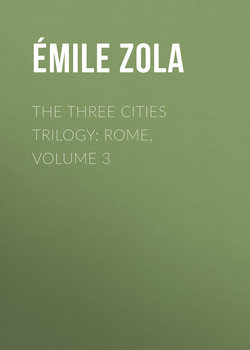The Three Cities Trilogy: Rome, Volume 3

Реклама. ООО «ЛитРес», ИНН: 7719571260.
Оглавление
Émile Zola. The Three Cities Trilogy: Rome, Volume 3
PART III
VII
VIII
IX
Отрывок из книги
On the following day as Pierre, after a long ramble, once more found himself in front of the Vatican, whither a harassing attraction ever led him, he again encountered Monsignor Nani. It was a Wednesday evening, and the Assessor of the Holy Office had just come from his weekly audience with the Pope, whom he had acquainted with the proceedings of the Congregation at its meeting that morning. "What a fortunate chance, my dear sir," said he; "I was thinking of you. Would you like to see his Holiness in public while you are waiting for a private audience?"
Nani had put on his pleasant expression of smiling civility, beneath which one would barely detect the faint irony of a superior man who knew everything, prepared everything, and could do everything.
.....
"Oh!" resumed the other, "I don't accuse his Holiness of sordid avarice, such as is rumoured. Some fabulous stories are current, stories of coffers full of gold in which the Holy Father is said to plunge his hands for hours at a time; treasures which he has heaped up in corners for the sole pleasure of counting them over and over again. Nevertheless, one may well admit that his Holiness is somewhat fond of money for its own sake, for the pleasure of handling it and setting it in order when he happens to be alone – and after all that is a very excusable mania in an old man who has no other pastime. But I must add that he is yet fonder of money for the social power which it brings, the decisive help which it will give to the Holy See in the future, if the latter desires to triumph."
These words evoked the lofty figure of a wise and prudent Pope, conscious of modern requirements, inclined to utilise the powers of the century in order to conquer it, and for this reason venturing on business and speculation. As it happened, the treasure bequeathed by Pius IX had nearly been lost in a financial disaster, but ever since that time Leo XIII had sought to repair the breach and make the treasure whole again, in order that he might leave it to his successor intact and even enlarged. Economical he certainly was, but he saved for the needs of the Church, which, as he knew, increased day by day; and money was absolutely necessary if Atheism was to be met and fought in the sphere of the schools, institutions, and associations of all sorts. Without money, indeed, the Church would become a vassal at the mercy of the civil powers, the Kingdom of Italy and other Catholic states; and so, although he liberally helped every enterprise which might contribute to the triumph of the Faith, Leo XIII had a contempt for all expenditure without an object, and treated himself and others with stern closeness. Personally, he had no needs. At the outset of his pontificate he had set his small private patrimony apart from the rich patrimony of St. Peter, refusing to take aught from the latter for the purpose of assisting his relatives. Never had pontiff displayed less nepotism: his three nephews and his two nieces had remained poor – in fact, in great pecuniary embarrassment. Still he listened neither to complaints nor accusations, but remained inflexible, proudly resolved to bequeath the sinews of life, the invincible weapon money, to the popes of future times, and therefore vigorously defending the millions of the Holy See against the desperate covetousness of one and all.
.....